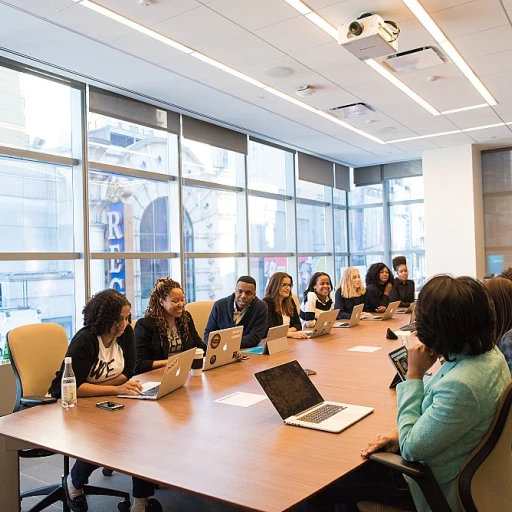
The Agile Office: More Than Just a Buzzword
Exploring the Flexibility and Efficiency of the Agile Approach
When you hear 'Agile Office,' you might think of software development teams swiftly adapting to change, but this innovative approach has secured a place far beyond IT departments. In the bustling commercial landscapes of Aotearoa, agile office management embodies a transformative way of organizing workspaces and workflow. The core of Agile lies in its flexibility and efficiency, focusing on collaboration, customer satisfaction, and the ability to pivot swiftly in response to change.
Decoding the Principles Behind Agile Office Operations
Embarking on the agile journey within office management means embracing a mindset where adaptability is king. The success of agile management is rooted in several key methodologies: iterative development, where projects are broken down into manageable units; a focus on continuous improvement; and fostering open channels of communication among cross-functional teams. These practices promote a holistic and responsive environment, encouraging team members to voice new ideas, share feedback, and implement change effectively.
Measure What Matters: Agile Metrics for Improved Performance
To truly thrive in an agile office, metrics are your compass. Tracking progress through key performance indicators (KPIs) such as lead time, cycle time, and throughput gives a clear picture of an office's agility. This data-driven approach not only enhances decision-making but also aligns office activities with broader business goals. By measuring what matters, office managers can pinpoint areas for improvement and showcase tangible achievements brought forth by agile practices.
Embracing the agile office management ethos is not merely about adopting a set of tools; it's about cultivating a dynamic, resilient office culture that can confidently navigate the complexities of New Zealand's ever-evolving market landscapes. With the successful implementation of Agile, offices can enjoy enhanced productivity, bolstered morale, and a sharper competitive edge.
Mapping the Agile Journey in Office Management Training
Embarking on the Agile Transformation Journey
Agile office management is synonymous with flexibility, efficiency, and continuous improvement. As New Zealand companies strive to be more adaptive in a rapidly changing business environment, understanding and implementing Agile principles becomes critical. It's a strategic pivot that requires a sound roadmap, and that's where Agile office management training comes into play.
Blueprint for Agile Adoption
When cultivating an Agile mindset, the first step is a comprehensive training program. Such trainings equip managers with an intricate understanding of Agile methodologies, enabling them to design processes that promote collaboration, transparency, and quick iteration. High-quality, detailed training is not just a luxury but a necessity—and it lays the foundation for a transformative office culture. To fuel this educational journey, access to cutting-edge content like cutting-edge office manager training is indispensable.
Customized Learning Pathways
Office management training for Agile transformation in New Zealand is not a one-size-fits-all solution. It involves curating a spectrum of learning opportunities, from workshops to online courses, to match different learning styles and organizational needs. Personalized training pathways accelerate the adoption of Agile practices by addressing the unique challenges faced by office managers in a local context.
Training should cover a range of topics including:
- Agile principles and values
- Scrum and Kanban methodologies
- Creating and managing cross-functional teams
- Techniques for fostering a collaborative office environment
- Effective backlog management and prioritization
Integrating these foundational elements ensures office managers can translate Agile concepts into day-to-day operations successfully.
From Theory to Practice
The true test of any training is its practical application. Case studies and interactive simulations play a pivotal role in translating theoretical knowledge into tangible actions. Office managers can benefit from scenarios and role-play exercises that mimic real-world challenges, allowing them to develop their problem-solving and decision-making skills in a supportive, risk-free environment.
Statistics suggest that organisations with a strong learning culture are 52% more productive and 92% more likely to develop novel products and processes. Therefore, emphasizing an experiential learning approach within Agile office management training can significantly enhance the performance and innovation output of New Zealand businesses.
Success Stories: Agile Office Management in Action
Agile Transformations in Practice: Case Studies from the Field
Agile office management isn't just theoretical—it's a movement that has been gaining momentum across numerous New Zealand businesses. By examining real-world case studies, we can gain insights into the tangible benefits of integrating agile practices into the office environment. One standout example comes from a Wellington-based marketing firm that adopted an agile model to great effect. After restructuring their workflow to allow for more flexible teamwork and iterative processes, they reported a 30% increase in productivity and a significant enhancement in employee satisfaction.
The Agile Office Manager: A Role Model for Innovation
In another inspiring story from Auckland, an office manager became a catalyst for change by spearheading the adoption of agile methodologies. This professional reimagined daily operations, embracing tools like Kanban boards and daily stand-up meetings to streamline communication. The outcomes were remarkable: project completion rates soared, and the improved transparency and collaboration led to a culture of continuous improvement within the organization.
Navigating the Transition with Grace and Efficiency
Transitioning to an agile office management model isn't without its challenges. However, with dedicated effort and strategic planning, successes can be abundant. Take, for instance, the case of a Christchurch-based tech startup that overcame initial resistance to change by offering comprehensive agile training. Through workshops and seminars, the office manager developed a well-informed and adaptable team capable of leveraging agile's benefits to outpace competitors.
Incorporating agile methodologies has also been linked to enhancing customer satisfaction. A notable Dunedin service provider reported a 25% increase in customer satisfaction scores after their office management team implemented agile feedback loops, enabling the company to respond swiftly to client needs and market changes.
These stories are just a glimpse into the impact of agile office management—proving that, when practiced diligently, agile can indeed be a transformative approach to office management in New Zealand. It fosters environments that flourish on adaptability, responsiveness, and employee empowerment, setting the stage for sustained business success.
Agile Tools and Techniques for the NZ Office Manager
Empowering NZ Office Managers with Agile Methodologies
Adapting to Agile in office management requires leveraging the right tools and methodologies that enable flexibility, collaboration, and efficiency. For NZ office managers, harnessing these tools can lead to increased productivity and better project outcomes. Tools such as Kanban boards, which provide a visual workflow management method, can help managers prioritize tasks and track progress. Additionally, project management software like Jira or Trello, which are renowned for their Agile-friendly interfaces, allow teams to manage tasks in sprints and adapt quickly to changes.
Agile Techniques for Enhanced Collaboration and Productivity
Agile office management is about fostering an environment where team collaboration thrives. Techniques like daily stand-ups, where team members share updates and discuss obstacles, are essential in maintaining openness and collective problem-solving. The retrospective meeting is another key Agile technique, allowing the office manager and team to reflect on the past sprint and identify areas for improvement. This continuous loop of feedback and adaptation is pivotal in advancing office efficiency.
Statistics indicate that Agile methodologies can lead to a significant increase in team productivity and project success. According to the 14th Annual State of Agile Report, 95% of respondents report that their organizations practice Agile, and 81% of those believe Agile improves team productivity.
Customizing Agile for the Kiwi Office
The one-size-fits-all approach doesn't apply when adopting Agile in New Zealand offices. Office managers should look to customize Agile frameworks to fit the unique cultural and operational context of their organization. Implementing Agile rituals such as backlog grooming and sprint planning can be adjusted to align with the size and pace of the office. Equally important is encouraging a mindset shift among team members to embrace the iterative processes of Agile, prioritizing customer value and responsiveness to change.
Overcoming Obstacles: Challenges of Adopting Agile in NZ Offices
Identifying and Tackling Resistance to Change
One of the most common hurdles when adopting an Agile approach in any industry, including office management in New Zealand, is resistance to change. Employees and managers alike may be accustomed to traditional ways of working and might view Agile methods with skepticism. To address this challenge, it’s essential to involve the whole team in the transformation journey, ensuring that everyone understands the benefits of Agile office management. Emphasizing the importance of adaptability and continuous improvement can shift the mindset towards a willingness to embrace change.
Adapting Agile to Local Corporate Culture
Agile methodologies, while universal in principle, often require customization to fit the unique corporate culture of New Zealand offices. Office managers need to analyze their organization's cultural dynamics and align Agile principles accordingly. Collaboration, open communication, and employee empowerment should be at the heart of Agile implementation, tailored to resonate with the Kiwi way of doing business.
Navigating the Complexity of Agile Practices
Agile practices can be complex, and office managers may struggle to apply them without comprehensive training. The myriad of Agile tools and techniques calls for a deep dive into each practice's nuances and benefits, as previously discussed. An initial investment in upskilling and continuous professional development is crucial. Office managers can elevate their expertise in Agile methodologies, ensuring smoother adoption and integration into daily operations.
Ensuring Consistent Application Across Teams
The hallmark of Agile is its iterative nature, which relies heavily on teams consistently applying its methodologies. However, consistency can be challenging in the face of team turnover or when scaling up Agile beyond small teams. Office managers need to establish robust Agile frameworks that support consistent application and scalability, which are essential for maintaining the integrity and benefits of Agile practices.
Leveraging the Right Technology and Tools
Agile office management is augmented by technology, with numerous tools available to facilitate collaboration, project tracking, and resource allocation. Yet, the plethora of choices can be overwhelming. New Zealand office managers must select the right tools that align with their office's specific needs, ensuring that technology becomes an enabler rather than a complication. Engaging with the right digital solutions is critical for driving the Agile transformation forward.






